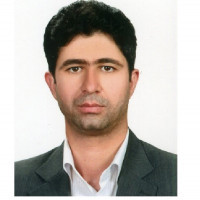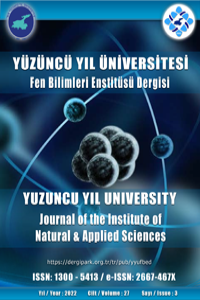Articles
Issue Editorial Board


 0000-0002-0177-7677
0000-0002-0177-7677




 0000-0002-0666-7784
0000-0002-0666-7784






 0000-0002-1147-9729
0000-0002-1147-9729
Aim & Scope
Our journal aims to contribute to the sharing, development and increase of the experimental and theoretical knowledge of all researchers working in the field of natural and applied sciences and to present the latest scientific developments to its readers.
- Yuzuncu Yil University Journal of the Institute of Natural and Applied Sciences is a scientific research journal founded in 1995. In our journal, scientific articles in the original research category, which are written in Turkish or English, are published. It is expected that the information produced will be such as being new, suggesting a new method or adding a new dimension to the previously existing information. Our journal does not include any articles such as letter to editor, discussions, and case reports. Our journal has been regularly published in the fields of engineering and architectural sciences, agriculture, fisheries and forestry sciences and basic sciences since 2018, in April, August and December.
Author Guidelines
PRINCIPLES OF PUBLISHING AND WRITING RULES
- Yüzüncü Yıl University Journal of the Institute of Natural and Applied Sciences is a scientific research journal founded in 1995. In our journal, scientific articles in the original research category, which are written in Turkish or English, are published. It is expected that the information produced will be such as being new, suggesting a new method or adding a new dimension to the previously existing information. Our journal does not include any articles such as letter to editor, discussions, and case reports. Our journal has been regularly published in the fields of engineering and architectural sciences, agriculture and forestry sciences and basic sciences since 2018, in April, August and December.Research articles, technical notes and reviews written in Turkish and English are published in our journal.
- Articles submitted for publication must not be published elsewhere or sent to any journal for publication. Older studies more than ten years are not accepted to evaluate.
- A research paper submitted to the journal for publication have following sections; Turkish and English Abstract, Introduction, Material and Method, Results, Discussion and Conclusion and References. Results and Discussions can either be combined into one section.
- Research Article 2500-5000 words, Reviews 4.000-7000 words and Technical Note must be within the limits of 1000-2500 words.
- Reviews should include a synthesis, interpretation, and evaluation of previous scientific studies and current developments by experienced authors in the field of research area (the corresponding author of the review should have at least 5 research articles in international refereed journals). Reviews published up to 10% of the number of articles published in each issue.
- If the research paper is summarized from graduate theses, this should be given as a footnote on the first page.
- Our journal adopts the Open Source Publication Policy.
- The articles published in our journal must comply with the scientific ethics rules. Manuscripts should be prepared in accordance with internationally accepted code of ethics.
- A copy of the report should be submitted with the manuscript in the studies where the Ethics Committee Report is required (studies related directly / indirectly to the animal).
- Any research carried out with qualitative or quantitative approaches that require data collection from participants using survey, interview, focus group work, observation, experiment, interview techniques
- Use of humans and animals (including material / data) for experimental or other scientific purposes,,
- Clinical researches on humans,
- Researches on animals,,
- Retrospective studies in accordance with the law of protection of personal data,
Also; - In the case reports, it is stated that the “informed consent form” was taken,
- Obtaining and expressing permission from the owners for the use of scales, surveys and photographs belonging to others,
- Stating that the copyright regulations are complied with for the ideas and works of art used
- 10. The articles submitted to Yüzüncü Yıl University Journal of the Institute of Natural and Applied Sciences are controlled through the iThenticate software. Similarity Index (SI) of the article should be <20%; Each similarity ratio should be <5%. If the similarity index is above the acceptable limits, the article will be returned to the author(s) (no more than 3 plagiarism scans are performed for an article). If revisions are not made within 10 days, the article will be rejected. If the plagiarism is proved after the publication of the article, that article will be withdrawn and removed from the website immediately and the author(s) will not be able to submit a paper for a period of five years to the Yüzüncü Yıl University Journal of the Institute of Natural and Applied Sciences.
- 11. All authors should sign the Copyright Form for the publication rights of their article to the Yüzüncü Yıl University Journal of the Institute of Natural and Applied Sciences. The article will not be taken into consideration unless the Copyright Form is submitted by the authors
- 12. The articles whose evaluation process is completed are published considering the date of submission. The articles are added to the first issue scheduled to be published as soon as they are ready for publication. The volume is published, after all articles will be published in the same volume are completed.
- 13. Response to control and correction postings to be sent to the author (s) during the page-layout the study should be replied within 15 days at the latest. The articles of the author (s) who are not responding within the specified period of time shall be forwarded for further volumes.
- 14. No changes are allowed in the article that is decided to be published. An author can publish a maximum of two study as a corresponding author, one without a corresponding author. The responsibility of the published study belongs to the author (s).
Writing Rules
- Articles submitted for publication in our journal should be prepared according to the journal writing rules. The study which are not in accordance with the writing rules will be returned to the authors and will not be accepted for peer-review. WRITING RULES AND TEMPLATE HERE. Sign the CHECKLIST before submitting your article to the system.
- In our journal, the writing language is Turkish and / or English. A good quality of scientific writing is required. The research must be understandable by a general scientific readership and by specialists. The research problem is identified, existing knowledge relevant to the problem is analyzed, the hypothesis is clear. Sentences are simple, short and direct, the style is concise and precise. Unnecessary and well-known info and unnecessary references should be avoided. Previously published data should be cited with reference to the formula and results. No reference of over 15 years should be used except for compulsory or exceptional cases. The number of references should not be more than 10 per 1000 words.
- Journal name abbreviations in the reference section should be arranged in accordance with "Web of Science Abbreviations”. Abbreviations used in the article should be written in full and provide in the parenthesis in the first mention. In all articles, the SI (International System of Units) units of measure and the decimal point must be used as a decimal fraction (1.25 instead of 1.25). Blank should be used to separate the thousands (100 000 instead of 100000)
- For printing, quality copies of pictures (300 dpi in JPG or TIFF format) should be sent as an additional file.
- Journal writing rules are also print format. Therefore, the rules of writing should be prepared carefully by the authors. Articles that do not comply with the writing rules will be sent back to the authors.
Evaluation Process
- The study prepared in accordance with the writing rules are first evaluated by the editors. At this stage, studies that do not comply with the aim and scope of the journal, have no originality, which are poor in terms of language and narrative rules in Turkish and English, have critical scientific and statistical analysis errors, and not suitable the publication policies, are rejected. The authors of the rejected studies will be informed within two weeks at the latest from the date of submission. The studies that are found to be suitable are sent to a section editor for the field of study for the pre-evaluation.
- In the pre-evaluation process, the section editors examine the introduction, material and method, results, discussion and conclusion sections of the studies in detail in terms of originality, the scope and scope of the journal publication policies. As a result of this evaluation, the studies which are not suitable are returned to author(s) within four weeks at the latest with the evaluation report of section editor.
- The works will be sent to the referees according to the content and the areas of expertise of the referees. In our journal, double-blind peer review process is applied in the article evaluations. Both the reviewer and author identities are concealed from the reviewers, and vice versa, throughout the review process.
- Articles sent to the referees are expected to be evaluated within 15 days. In case of exceeding this period, the editor will give an additional 7 days by reminding the reviewer. In case of exceeding this period, the editor will withdraw the request from the former reviewer by appointing a new reviewer.
- The article accepts to publish that recommended to publish by two reviewers. If reviewers decide differently, study is sent to a third referee.
- The reports received from the reviewers will be examined by the section editor within 2 weeks at the latest. As a result of this evaluation, the section editor submits its final decision to the chief-editor. The final decision for the article is given by the chief-editor.
- Major (significant corrections required) or minor (minor corrections are required) revision decision will be issued for the improvement of articles which are not considered sufficient, in line with the recommendations of the reviewers. Articles that do not revised according to reviewers’ reports, are rejected.
- After the major or minor revision decision given to the article, the necessary changes are realized by the author within 30 days for major revision; 15 days for minor revision. Otherwise, the article is rejected.
Ethical Principles and Publication Policy
Yuzuncu Yil University Journal of Institute of Natural and Applied Sciences Higher Education Institutions “Scientific Research and Publication Ethics Directive”, ite COPE Code of Conduct and Best Practice Guidelines for Journal Editors “and“ COPE Best Practice Guidelines for Journal Editors ”published by Commitee on Publication Ethics (COPE) undertakes to fulfill ethical duties and responsibilities on the basis of; It expects the authors and referees to act within this framework.
The articles submitted to the journal should have been approved by the ethics committee for studies on human and animal clinical and experimental subjects requiring an ethical committee decision, and this approval should be stated and documented in the article.
Ethical responsibilities of editors and co-editors
They should make a positive or negative decision by evaluating the importance, original value, validity, clarity of narrative and compliance with the aims and objectives of the journal. If it decides to reject the manuscript at the end of the first review, they are obliged to inform the authors clearly.
The editor and his / her assistants should notify the author whether the manuscripts submitted for publication in the journal have been evaluated within 15 days. The editor or his / her assistants are responsible for deciding which papers should be published.
The manuscripts submitted to the journal should be checked first by the editor or his / her assistants in case of plagiarism. At this stage, plagiarism is rejected by the editor or his / her assistants.
Unpublished methods and information contained in the manuscripts submitted to the journal should not be used by anyone in their own work without the express written permission of the authors.
The studies sent to the journal; the social, cultural, economic characteristics and religious beliefs of the authors should be considered only within the framework of their intellectual values.
Manuscripts submitted to the journal should not be disclosed to anyone other than the authors, referees, co-editors and publishers of the study by the editor or his / her assistants.
They should send the manuscripts to the referees who are suitable for their knowledge.
They should encourage the referees to consider working in an objective, scientific and objective language.
They must establish the referee pool and keep it up to date. In the referee pool; they should evaluate the articles objectively, perform the arbitration process in a timely manner, evaluate the article with constructive criticism and act in accordance with ethical rules.
If the manuscripts submitted to the journal by the editor or his / her assistants determine that there is a conflict of interest with another author and / or institution, the study should be withdrawn from the publication / evaluation process.
The final opinion regarding the acceptance or rejection of the manuscripts submitted to the journal belongs to the editor. The editor should make his / her decision taking into account the originality and importance of the work.
The Editor should not suggest authors to refer to any article or other work in the journal for acceptance of the manuscripts submitted to the journal.
Ethical responsibilities of referees
An arbitrator who feels that he / she does not have sufficient information about the study submitted to him / her by the editor or his / her assistants for evaluation, or who is unable to make an immediate evaluation, should leave the evaluation task by informing the editor.
The referees should make their evaluation in accordance with the principle of confidentiality. Persons other than the editor or his / her assistants should not be shown or discussed with others.
The referees should keep the privileged information and ideas obtained during the review process confidential and not use them for personal benefit. In addition, referees should not use any part of the data of the work that they have evaluated and which has not yet been published.
The criticism of the referee should be objectively made. No personal criticism should be directed against the author. The referees should express their opinions with arguments that explicitly support them.
The referees should communicate the situation to the editor if they find a substantial similarity or overlap with another previously published study.
The referees evaluate the work that the author has found to be in competition, cooperation or otherwise.
Ethical responsibilities of authors
The articles submitted to Yuzuncu Yil University Journal of Institute of Natural and Applied Sciences should be original studies in accordance with the mentioned fields of study.
Authors cannot submit their manuscripts to another journal at the same time. Forbidden to publish same research in more than one journal
Authors should collect the data related to their studies within the framework of ethical principles. The authors are obliged to pass on the raw data, which constitute the basis of the study, to the publishers, editors and referees.
The articles submitted for publication should not be contrary to the ethics of scientific publications (plagiarism, falsification, distortion, republishing, slicing, unfair authorship, not specifying the supporting organization and not obeying the ethical rules in animal studies).
The manuscripts submitted to the journal should contain sufficient reference information and detail. Fraudulent and deliberate false statements are unacceptable as they lead to unethical situations. Theses or studies that have not been presented or accepted yet cannot be used as a reference without the permission of the owner. List of references should be provided by authors.
Potential conflicts of interest of the authors should be indicated. Authors are obliged to declare the institutions, financial sources or conflicts of interest that they support.
Every person who contributes to the design, implementation or interpretation of the study submitted to the journal should be indicated in the study. All contributors should be listed following the first author. Other people should be added to the know Acknowledgment ”part of the study.
He is considered as the “Responsible Author yapan who makes correspondence with the related journal / institution during the publication process. The responsible author should share his / her correspondence with the other authors and make the necessary actions in a timely and correct manner.
If the author detects a significant error or defect within the published work in the journal, he / she is obliged to inform the editor or publisher of this situation immediately and cooperate with the editor to correct the existing error or defect.
All authors are considered responsible for the content of the manuscript. It is unethical that a person who has no contribution in an article is a writer. Likewise, it is unethical that someone who contributes significantly to the publication is not among the authors.
Actions contrary to Scientific Research and Publication Ethics
Fiction: fabricate, report or publish data, such as made without scientific research,
Distortion: To falsify research records and obtained data, to show that methods, devices and materials that are not used in the research are used, not to evaluate data that are not in accordance with the research hypothesis, to play with data and / or results to fit relevant theories or assumptions, in line with the interests of the persons and organizations supported falsify or shape research results,
Plagiarism: To present the ideas, methods, data, practices, writings, forms or works of others as if it is their own work without referring to their owners in accordance with scientific rules,
Fraud: Producing data that is not based on research, editing or modifying the submitted or published work based on unrealistic data, reporting or publishing them, showing as if a research has not been conducted,
Simultaneous submission: Republishing the results of a research to another journal without the permission of the editor of the first journal,
Slicing: To present the results of a research as separate works in the evaluation of associate professorship examinations and academic promotions by disrupting the integrity of the research, disaggregating it inappropriately and making numerous publications without referring to each other,
Unfair authorship: To include people who do not have active contributions to the authors, not to include those who have active contributions to the authors, to change the order of the author in an unjustified and inappropriate manner, to remove the names of those who have active contributions during publication or in subsequent editions, and to use their name even though they do not have active contributions. include among the authors,
Other types of ethical violations: Not to clearly state the support of individuals, institutions or organizations and their contributions in the publications of researches conducted with the support, not to obey ethical rules in human and animal researches, to respect the rights of patients in their publications, and to take part in a work that is assigned to review as a referee. to share field information with others before publication, to use resources, spaces, facilities and equipment provided or reserved for scientific research in an unintentional manner, and to accuse completely unsubstantiated, unwarranted and deliberate ethical breaches.
PUBLISHING POLICY
1. Yüzüncü Yıl University Journal of the Institute of Natural and Applied Sciences is a scientific research journal founded in 1995. In our journal, scientific articles in the original research category, which are written in Turkish or English, are published. It is expected that the information produced will be such as being new, suggesting a new method or adding a new dimension to the previously existing information. Our journal does not include any articles such as letter to editor, discussions, and case reports. Our journal has been regularly published in the fields of engineering and architectural sciences, agriculture and forestry sciences and basic sciences since 2018, in April, August and December.Research articles, technical notes and reviews written in Turkish and English are published in our journal.
2. Articles submitted for publication must not be published elsewhere or sent to any journal for publication. Older studies more than ten years are not accepted to evaluate.
3. A research paper submitted to the journal for publication have following sections; Turkish and English Abstract, Introduction, Material and Method, Results, Discussion and Conclusion and References. Results and Discussions can either be combined into one section.
4. Research Article 2500-5000 words, Reviews 4.000-7000 words and Technical Note must be within the limits of 1000-2500 words.
5. Reviews should include a synthesis, interpretation, and evaluation of previous scientific studies and current developments by experienced authors in the field of research area (the corresponding author of the review should have at least 5 research articles in international refereed journals). Reviews published up to 10% of the number of articles published in each issue.
6. If the research paper is summarized from graduate theses, this should be given as a footnote on the first page.
7. Our journal adopts the Open Source Publication Policy.
8. The articles published in our journal must comply with the scientific ethics rules. Manuscripts should be prepared in accordance with internationally accepted code of ethics.
9. A copy of the report should be submitted with the manuscript in the studies where the Ethics Committee Report is required (studies related directly / indirectly to the animal).
- Any research carried out with qualitative or quantitative approaches that require data collection from participants using survey, interview, focus group work, observation, experiment, interview techniques
Use of humans and animals (including material / data) for experimental or other scientific purposes,,
Clinical researches on humans,
Researches on animals,,
Retrospective studies in accordance with the law of protection of personal data,
Also;
In the case reports, it is stated that the “informed consent form” was taken,
Obtaining and expressing permission from the owners for the use of scales, surveys and photographs belonging to others,
Stating that the copyright regulations are complied with for the ideas and works of art used.
10. The articles submitted to Yüzüncü Yıl University Journal of the Institute of Natural and Applied Sciences are controlled through the iThenticate software. Similarity Index (SI) of the article should be <20%; Each similarity ratio should be <5%. If the similarity index is above the acceptable limits, the article will be rejected. If the plagiarism is proved after the publication of the article, that article will be withdrawn and removed from the website immediately and the author(s) will not be able to submit a paper for a period of five years to the Yüzüncü Yıl University Journal of the Institute of Natural and Applied Sciences.
11. All authors should sign the Copyright Form for the publication rights of their article to the Yüzüncü Yıl University Journal of the Institute of Natural and Applied Sciences. The article will not be taken into consideration unless the Copyright Form is submitted by the authors
12. The articles whose evaluation process is completed are published considering the date of submission. The articles are added to the first issue scheduled to be published as soon as they are ready for publication. The volume is published, after all articles will be published in the same volume are completed.
13. Response to control and correction postings to be sent to the author (s) during the page-layout the study should be replied within 15 days at the latest. The articles of the author (s) who are not responding within the specified period of time shall be forwarded for further volumes.
14. No changes are allowed in the article that is decided to be published. An author can publish a maximum of two study as a corresponding author, one without a corresponding author. The responsibility of the published study belongs to the author (s).
Writing Rules
1. Articles submitted for publication in our journal should be prepared according to the journal writing rules. The study which are not in accordance with the writing rules will be returned to the authors and will not be accepted for peer-review. WRITING RULES AND TEMPLATE HERE. Sign the CHECKLIST before submitting your article to the system.
2. In our journal, the writing language is Turkish and / or English. A good quality of scientific writing is required. The research must be understandable by a general scientific readership and by specialists. The research problem is identified, existing knowledge relevant to the problem is analyzed, the hypothesis is clear. Sentences are simple, short and direct, the style is concise and precise. Unnecessary and well-known info and unnecessary references should be avoided. Previously published data should be cited with reference to the formula and results. No reference of over 15 years should be used except for compulsory or exceptional cases. The number of references should not be more than 10 per 1000 words.
3. Journal name abbreviations in the reference section should be arranged in accordance with "Web of Science Abbreviations”. Abbreviations used in the article should be written in full and provide in the parenthesis in the first mention. In all articles, the SI (International System of Units) units of measure and the decimal point must be used as a decimal fraction (1.25 instead of 1.25). Blank should be used to separate the thousands (100 000 instead of 100000)
4. For printing, quality copies of pictures (300 dpi in JPG or TIFF format) should be sent as an additional file.
5. Journal writing rules are also print format. Therefore, the rules of writing should be prepared carefully by the authors. Articles that do not comply with the writing rules will be sent back to the authors.
Evaluation Process
1. The study prepared in accordance with the writing rules are first evaluated by the editors. At this stage, studies that do not comply with the aim and scope of the journal, have no originality, which are poor in terms of language and narrative rules in Turkish and English, have critical scientific and statistical analysis errors, and not suitable the publication policies, are rejected. The authors of the rejected studies will be informed within two weeks at the latest from the date of submission. The studies that are found to be suitable are sent to a section editor for the field of study for the pre-evaluation.
2. In the pre-evaluation process, the section editors examine the introduction, material and method, results, discussion and conclusion sections of the studies in detail in terms of originality, the scope and scope of the journal publication policies. As a result of this evaluation, the studies which are not suitable are returned to author(s) within four weeks at the latest with the evaluation report of section editor.
3. The works will be sent to the referees according to the content and the areas of expertise of the referees. In our journal, double-blind peer review process is applied in the article evaluations. Both the reviewer and author identities are concealed from the reviewers, and vice versa, throughout the review process.
4. Articles sent to the referees are expected to be evaluated within 15 days. In case of exceeding this period, the editor will give an additional 7 days by reminding the reviewer. In case of exceeding this period, the editor will withdraw the request from the former reviewer by appointing a new reviewer.
5. The article accepts to publish that recommended to publish by two reviewers. If reviewers decide differently, study is sent to a third referee.
6. The reports received from the reviewers will be examined by the section editor within 2 weeks at the latest. As a result of this evaluation, the section editor submits its final decision to the chief-editor. The final decision for the article is given by the chief-editor.
7. Major (significant corrections required) or minor (minor corrections are required) revision decision will be issued for the improvement of articles which are not considered sufficient, in line with the recommendations of the reviewers. Articles that do not revised according to reviewers’ reports, are rejected.
8. After the major or minor revision decision given to the article, the necessary changes are realized by the author within 30 days for major revision; 15 days for minor revision. Otherwise, the article is rejected.
Price Policy
All expenses of the journal are covered by the Van Yüzüncü Yıl University. Processing and publication are free of charge with the journal.
There is no article processing charges or submission fees for any submitted or accepted articles.

